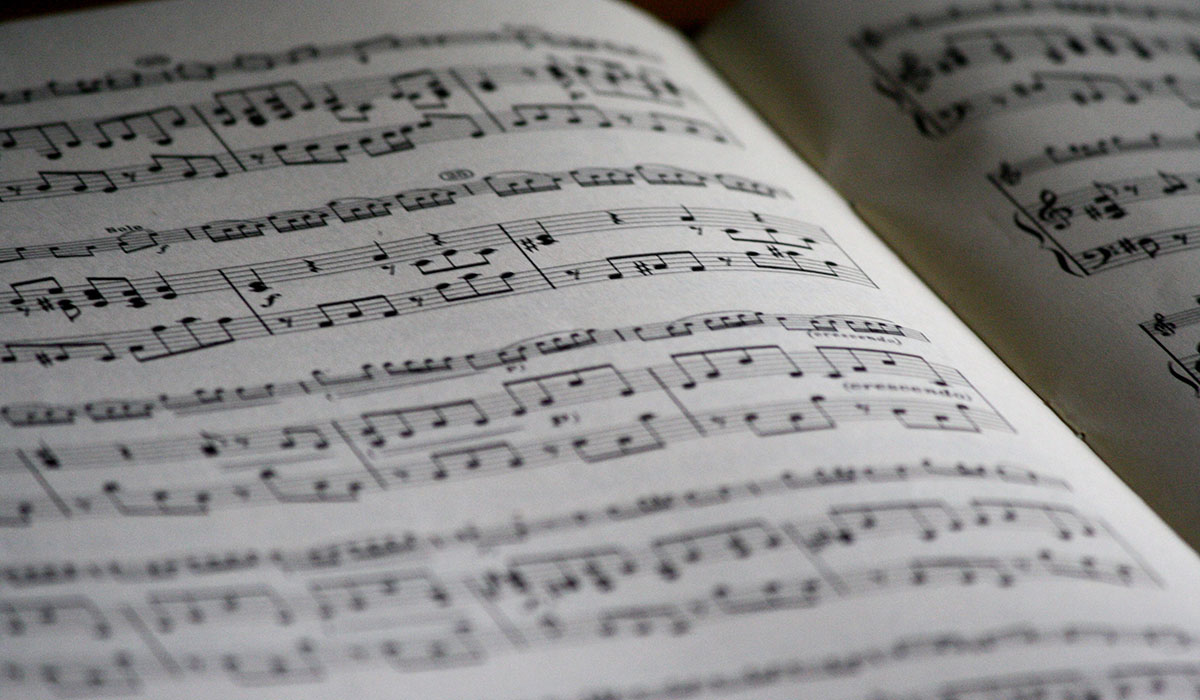
The DMA program in Composition is currently not accepting students.
The Doctor of Musical Arts — the Department of Music's highest professional composition degree — is designed for those students who have already demonstrated significant compositional achievement, and who show great professional promise. Typically a three- to four-year program, the D.M.A. program in Composition is designed to prepare the student for a career either as a university-affiliated composer or as an independent professional. Please click here for information on applying to our graduate programs in composition. Below you will find information on the curriculum and graduation requirements for the DMA program.
Curriculum
The D.M.A. in Composition requires 54 to 72 credit hours of non-remedial coursework beyond that completed for the M.M. degree. There is normally a two-year residency requirement. As a D.M.A. Composition student, you will be advised into coursework based on the results of your entrance examinations: the Theory Placement Examination and the Music History Placement Examination, given to all entering graduate students, and the D.M.A. Entrance Exam in Composition.
Each D.M.A. student pursues an individually-tailored curriculum, determined in consultation with the academic advisor at the beginning of the first semester of residence. The sample curriculum linked below shows what a typical D.M.A. Composition curriculum may contain, but each student's curriculum will be slightly different.
These requirements are for students beginning a D.M.A. in Composition Fall 2012 or later. For previous requirements, see the CUA Announcements for your admission year.
Representative D.M.A. composition curriculum
Total: 54-72 required credit hours
Graduation Requirements
Comprehensive Examinations (COMP 698; 699 w/o classes) (written and oral; 0 semester hours). The comprehensive examinations may be scheduled, with approval of the student's advisory committee, following the completion of coursework. The examination consists of a written and oral portion. The written portion will be scheduled during the regular university time for comprehensive examinations offered every semester. The student must schedule the oral portion of the comprehensive examination within three weeks after the successful completion of the written portion.
D.M.A. Research Document (MUS 905A; 0 semester hours; no grade). The D.M.A. document is an article-length (ca. 10,000 words, excluding footnotes and bibliography) scholarly essay of original research undertaken while in residence in the doctoral program, on a topic approved by the candidate's advisory committee. The candidate must submit a formal D.M.A. document proposal to the committee for approval after having been admitted to candidacy. In order to be admitted to candidacy, the student must pass the comprehensive examinations and must be recommended by the faculty in the area of study.
D.M.A. Composition Recital (MUS 905B; 0 semester hours; pass-fail). The D.M.A. recital is to be an original program of 30-45 minutes of solo and chamber music composed while in residence in the D.M.A. Composition program. The program is subject to approval by the student's advisory committee and must be submitted at least one month in advance of the proposed recital date.
D.M.A. Dissertation Composition (MUS 905C; 0 semester hours; no grade). The dissertation composition is an original work of 20-30 minutes' duration, for large ensemble, to be approved by the student's advisory committee.
Applied Study in the DMA Composition Program
With the composition advisor's permission, and by audition, a D.M.A. student may substitute up to 12 semester hours of applied music instruction (MUPI) for music electives. The student must be accepted for graduate-level study on the applied instrument or voice by the applied faculty, and must take a jury every semester in which credit is sought.
Minor in Latin American Music
The advisory committee, in conference with the student, will arrange a program of study of 54 to 72 semester hours beyond the master's degree, which will include at least 12 semester hours of Latin American music electives. The D.M.A. research document and/or the dissertation composition should be based on Latin American subject matter. In addition, the recital should include at least one composition related to a Latin American topic.
Minor in Musicology
The advisory committee, in conference with the student, will arrange a program of study of 54 to 72 semester hours beyond the master's degree, which will include at least 12 semester hours of musicology courses beyond the minimum number of hours already required for the degree. Three of those semester hours must be Research Methodology (MUS 731), unless the student has taken a similar course for the master's degree. At the conclusion of coursework, the student will take a written, four-hour minor comprehensive examination (based on four musicology courses selected by the student).
